
Readings:
Reading 1: Acts 1:1:1-11
Responsorial Psalm: Psalm 47:2-3, 6-7, 8-9
Reading 2: Ephesians 1:17-23
Gospel: Mark: 16:15-20
“A TIME FOR PILGRIMAGES…”
With the feast of the Ascension, we bring the joyous Easter season to its climax. Traditionally celebrated on a Thursday, most dioceses in the United States move it to the following Sunday to enable more people to take part in this “holy day of obligation.” Coming up the following week is Pentecost and the storm of the Spirit that gives birth to the Church.
The account of the Ascension is found in Luke’s Gospel and in his second volume, the Acts of the Apostles. During the interval after the Resurrection, Luke portrays the Risen Jesus instructing his disciples for the last time before he returns in triumph to his Father, thus completing his mission on earth. I always recall on this day a panel of carvings from the beautiful medieval altar screen in the Cathedral of Chartres. I had visited this breathtaking church as a graduate student in Europe years ago. The last panel in this series of gospel scenes depicts the disciples seated around a table and all looking up to the ceiling where there dangles a pair of legs—it was Jesus on his way to heaven!
In fact, the artist picks up a moment that Luke describes in the passage we hear this Sunday from the Acts of the Apostles. As Jesus is lifted from the apostles’ sight, they keep looking in amazement at the sky. But “suddenly” two angels appear and shake them from their stupor: “Why are you standing there looking at the sky?” Their role now is not to wax nostalgic about the Jesus they loved to be with, but to take to heart his last command to them: “You will receive power when the Holy Spirit comes upon you, and you will be my witnesses in Jerusalem, throughout Judea and Samaria, and to the ends of the earth.”
The Spirit of Jesus is an expansive spirit that will drive the early Christian community out into the wider world, commissioned to proclaim God’s saving love “to the ends of the earth.” The unfolding narrative that follows in the Acts of the Apostles charts that centrifugal movement. The crossing of cultural, ethnic, and religious boundaries required of the early church was not without great challenges and setbacks. The early Jewish Christians and their leaders struggled to discern what was essential to retain from their sacred Jewish heritage, and what could be adjusted or changed to make room for Gentile Christians.
The second reading from the Letter to the Ephesians on this feast captures in poetic fashion this soaring vision of one people forged from many nations, urging the followers of Jesus to “bear with one another through love, striving to preserve the unity of the Spirit through the bond of peace: one body and one Spirit, as you were also called to the one hope of your calling; one Lord, one faith, one baptism; one God and Father of all, who is over all and through all and in all.”
We celebrate this exuberant feast and hear these readings in a world still reeling from the impact of the pandemic. While our own country seems to be making headway in quelling the virus, other parts of the world such as India are still being devastated, and lack the resources to care for untold numbers of victims. Coupled with the assault of the virus, we also seem to be infected with debilitating conflicts and polarities in our body politic and even in our church.
Recently I read Pope Francis’s remarkable reflections on the impact of the pandemic in his book, Let Us Dream. The Path to a Better Future. One of his observations came back to me in thinking about the disciples’ reaction to Jesus’ Ascension. The Pope noted how many of us during the lockdown have stayed pretty much at home, venturing out only for a walk to stretch our legs or to go to the store. But then we would return to our familiar “shelter in place.” We were “like a tourist who goes to the sea or the mountains for a week of relaxation but then returns to her suffocating routine. She has moved, but sideways, only to come back to where she started.” Pope Francis contrasts this routine with another kind of experience, that of “pilgrimage.” The authentic pilgrim “goes out from herself, opens herself to a new horizon, and when she comes home she is no longer the same, and so her home won’t be the same.” The Pope concludes: “This is a time for pilgrimages.”
This feast reminds us that often the Spirit of Jesus given to us at baptism can run against the grain of the prevailing forces in our society. Building bridges instead of barriers; seeking reconciliation more than confrontation; welcoming those on the periphery rather than ignoring them. Living, as the Letter to the Ephesians reminds us, “in a manner worthy of the call you have received, with all humility and gentleness, with patience, bearing with one another through love, striving to preserve the unity of the spirit through the bond of peace.”
Rev. Donald Senior, CP
President Emeritus, Chancellor,
Professor of New Testament Studies
Adapted from “Perspectives on Scripture,” Donald Senior’s weekly column in Chicago Catholic; used with permission.